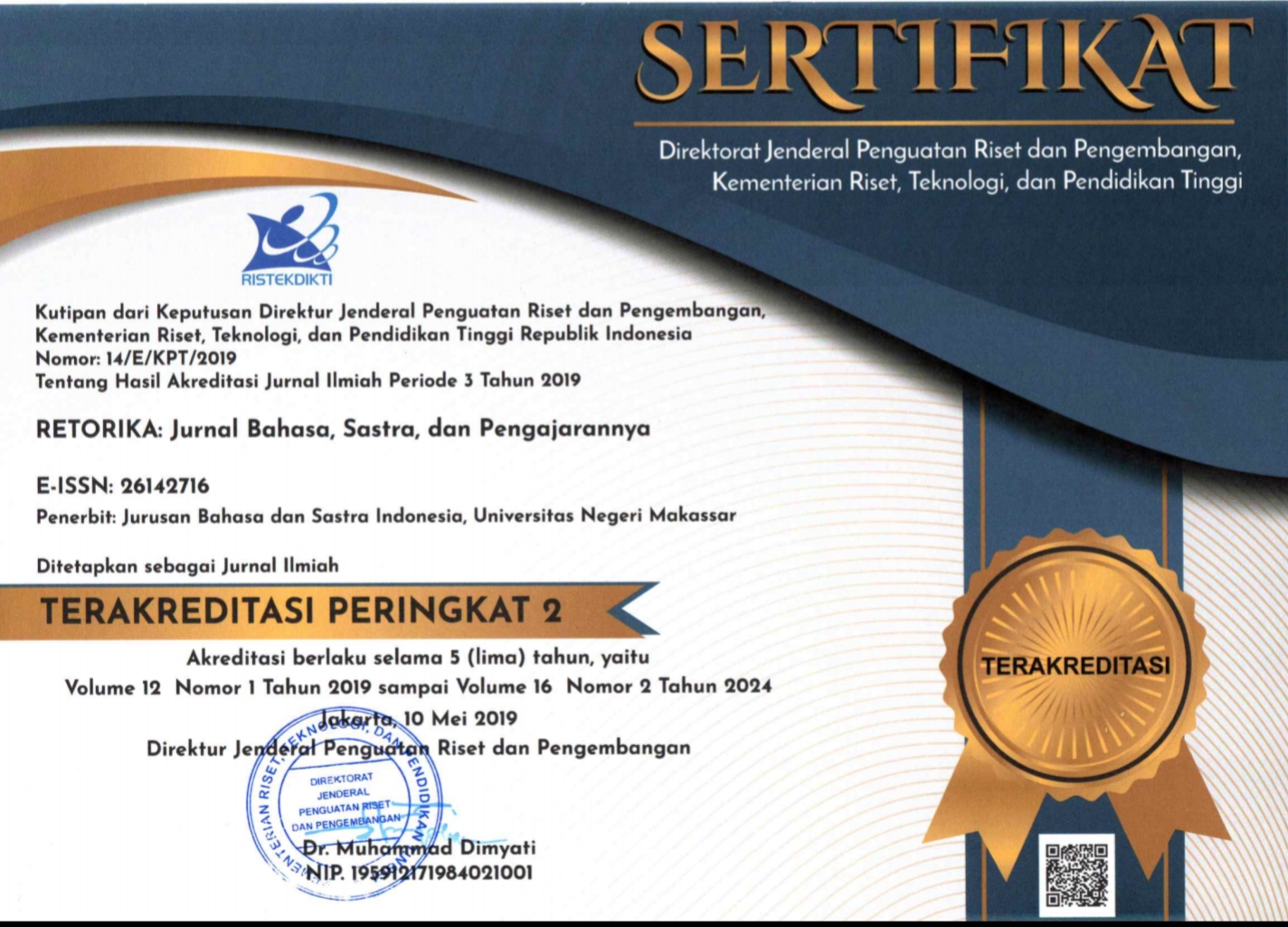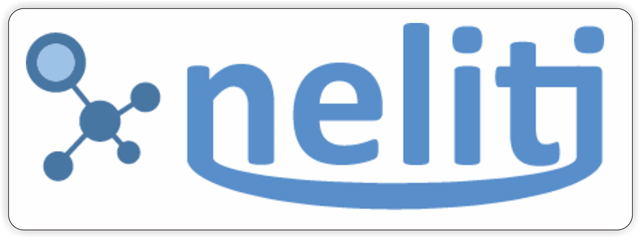MARKET NAMES IN MEDAN: A NATURAL SEMANTIC METALANGUAGE STUDY
(1) Universitas Sumatera Utara
(2) Universitas Sumatera Utara
(*) Corresponding Author
DOI: https://doi.org/10.26858/retorika.v13i2.11985
Abstract
Keywords
Full Text:
PDFReferences
Algeo, J. (2010). Is a Theory of Names Possible? Names, 58 (2): 90-96.
Altman, I. & Setha M. L. (1992). In Place Attachment. New York: Plenum Publishing Corporation.
Bach, K. (2002). Giorgione was So-Called Because of His Name, Philosophical Perspectives. Oxford: Oxford University Press.
Darheni, N. (2010). Leksikon Aktivitas Mata dalam Toponim di Jawa Barat: Kajian Etnosemantik. Jurnal Linguistik Indonesia, 28 (1): 55-67.
Fatikhudin, P. (2018). Penamaan Tempat Usaha Ber-bahasa Asing di Surabaya: Kajian Semantik Kognitif. BASINDO, 2 (2), 2018: 88-99. http:// journal2.um.ac.id/index.php/basindo
Gladkova, A. (2002). The Semantics of Nicknames of the American Presidents. Makalah disajikan dalam Conference of the Australian Linguistic Society.
Miles, M.B. & Huberman, A.M. (1992). Analisis Data Kualitatif. Diterjemahkan oleh Tjetjep Rohendi Rohidi. Jakarta: University Indonesia Pers.
Khotimah, K. & Ika F. (2019). Kajian Semantik Nama Diri Mahasiswa Madura di Prodi Pendi-dikan Bahasa dan Sastra Indonesia Universitas Tru-nojoyo Madura. Jurnal Pendidikan Bahasa dan Sastra Indonesia, 8 (1): 51-55. http://journal. unnes.ac.id/sju/index.php/jpbsi
Moleong, L. J. Metodologi Penelitian Kualitatif Edisi Revisi. Bandung: Remaja Rosdakarya Offset.
Mulyadi & Rumnasari K. Siregar. (2006). Aplikasi Teori Metabahasa Makna Alami dalam Kajian Makna. Jurnal LOGAT, 11 (2): 69-74.
Munazar, A. (2016). Penamaan ‘Lum’ pada Kelompok Masyarakat Dinamisme di Bangka Bagian Utara: Sebuah Tinjauan Semantik Pragmatik. Jurnal Society, 6 (2): 27-37.
Palmer. (1981). Semantics: Second Edition. Cambri-dge: University Press.
Sibarani, R. et. al. (2003). Semantik Bahasa Batak Toba. Jakarta: Pusat Bahasa Depertemen Pen-didikan Nasional.
Sudaryanto. (2015). Metode dan Aneka Teknik Ana-lisis Bahasa. Yogyakarta: Sanata Dharma University Press.
Sutopo, H. B. (2002). Metodologi Penelitian Kua-litatif: Teori dan Aplikasinya dalam Peneliti-an. Surakarta: Sebelas Maret University Press.
van Langendonck, W. & Mark v.d.V. (2016). "Names and Grammar." In The Oxford Handbook of Names and Naming, by Carole Hough, 17-38. Oxford: Oxford University Press.
Widani, N. N. (2016). Makna “Mengambil” Bahasa Bali: Pendekatan Metabahasa Semantik Alami (MSA). Retorika, 2 (1): 127-141. DOI: 10.22 225/jr.2.1.242.124-137
Williams, D. R. & Jerry J. V. (2003). The Measur-ement of Place Attachment: Validity. Forest Science, 49 (6): 830-340.
Wong, B. (2015). "Kata Pajak di Kota Medan Berasal dari Bahasa Karo" https://www.kompasiana. com/billwong/5528bbd9f17e61357f8b45bd/ kata-pajak-di-kota-medan-berasal-dari-bahasa-karo
Article Metrics
Abstract view : 542 times | PDF view : 84 timesRefbacks
- There are currently no refbacks.
Copyright (c) 2020 Latifah Yusri Nasution

This work is licensed under a Creative Commons Attribution-NonCommercial 4.0 International License.
Published by:
Department of Indonesian Language, Faculty of Languages and Literature, Universitas Negeri Makassar in cooperate with Asosiasi Dosen Bahasa dan Sastra Indonesia (ADOBSI) and Ikatan Program Studi Pendidikan Bahasa dan Sastra Indonesia (IKAPROBSI).
Address: Department of Indonesian Language Office, DG Building Second Floor, UNM Parangtambung, Daeng Tata Raya Street, Makassar, South Sulawesi, Indonesia
 Email: retorika@unm.ac.id
Email: retorika@unm.ac.id

RETORIKA: Jurnal Bahasa, Sastra,dan Pengajarannya is licensed under a Creative Commons Attribution-NonCommercial 4.0 International License.
















